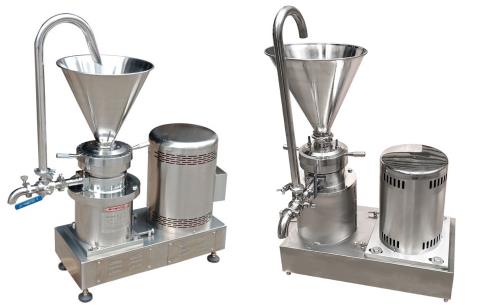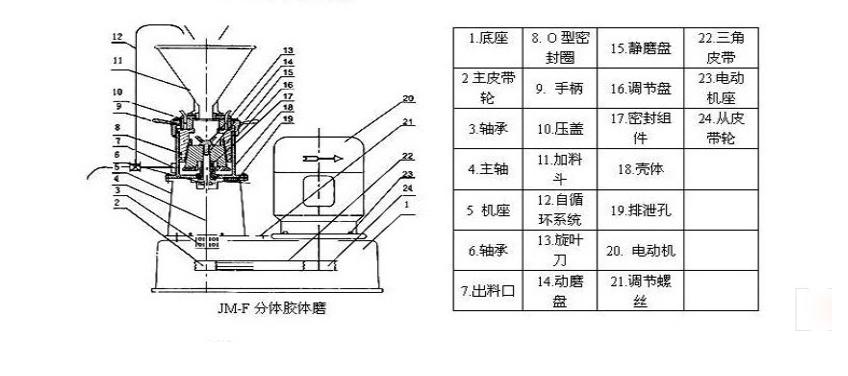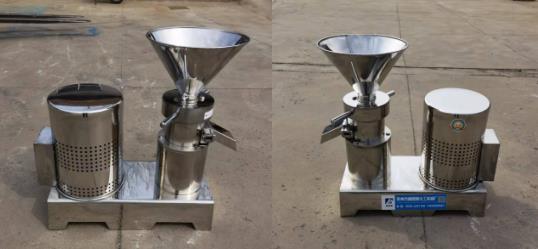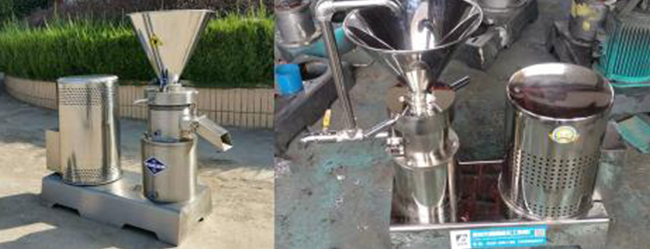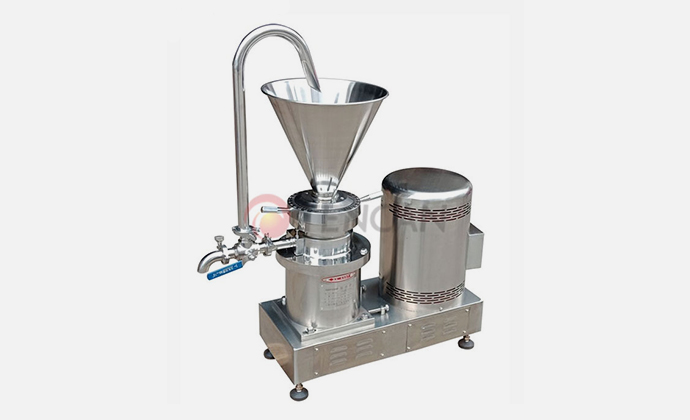
Colloid mill is composed of stainless steel and semi stainless steel colloid mills. Colloidal grinding relies on the relative high-speed rotational motion of the two tooth surfaces of the rotor and stator, while maintaining a small gap between the rotor and stator. When the processed material passes through the high-speed rotating rotor and stator, it is subjected to strong shear force, centrifugal force, friction force, and under the combined force of high-frequency vibration, high-speed vortex, etc., the material is effectively dispersed, emulsified, crushed, and homogenized.
Except for the motor and some components, all components in contact with materials in the colloid mill are made of high-strength stainless steel, especially the key dynamic and static grinding discs for strengthening treatment. Therefore, it has good corrosion resistance and wear resistance, making the processed materials pollution-free, hygienic and pure.
| Model | Voltage
(V) |
Power
(KW) |
Rotation Speed
(rpm) |
Fineness
(um) |
Capacity
(t/h) |
Net Weight
(kgs) |
Dimensions
(mm) |
| JTM-50 | 220 | 1.5 | 3000 | 2-70 | 0.2-0.8 | 60 | 500*230*700 |
| JTM-80 | 380 | 5.5 | 3000 | 2-70 | 0.2-4.0 | 300 | 1050*300*840 |
Colloidal grinding is a process in which an electric motor drives the rotating teeth (or rotor) through a belt drive to rotate at high speed relative to the matching fixed teeth (or stator). One of them rotates at high speed while the other remains stationary. The processed material is pressurized by its own weight or external pressure (which can be generated by the pump) to generate downward spiral impact force. When passing through the gap (adjustable gap) between the fixed and rotating teeth, it is subjected to strong shear force, friction force High frequency vibration, high-speed vortices, and other physical effects effectively emulsify, disperse, homogenize, and crush materials, achieving the effect of ultrafine crushing and emulsification of materials.
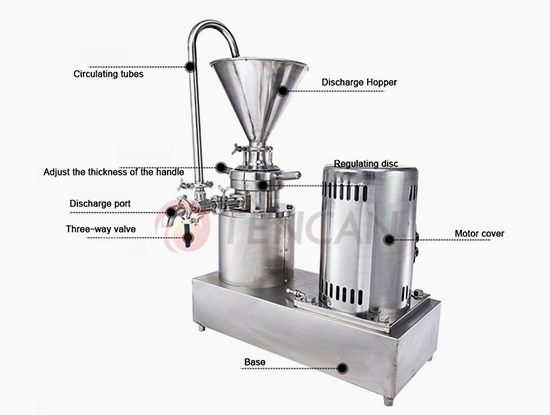
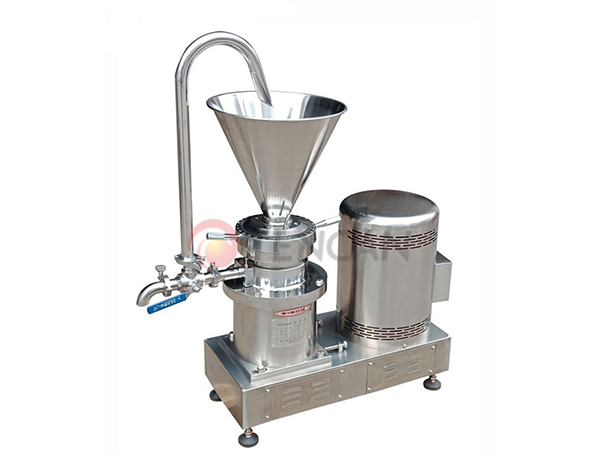
Compared to pressure homogenizers, colloid mills are primarily centrifugal equipment with the advantages of simple structure, convenient equipment maintenance, and suitability for materials with high viscosity and larger particles. Its main drawbacks are also determined by its structure. Firstly, due to centrifugal motion, the flow rate is not constant, and the flow rate varies greatly for materials with different viscosities. For example, the same equipment can have a flow rate difference of more than 10 times when handling viscous paint materials and thin milk fluids; Secondly, due to high-speed friction between the rotor and the material, it is easy to generate large amounts of heat, causing denaturation of the processed material; Thirdly, the surface is prone to wear, and after wear, the refinement effect will significantly decrease.
1) This machine has the characteristics of compact structure, smooth operation, low noise, corrosion resistance, easy cleaning, and convenient maintenance.
2) Colloidal grinding machines are available in various models and specifications, including vertical, horizontal, and split types. The components in contact with the same material are all made of high-quality stainless steel. The tooth shape of the dynamic and static grinding discs varies depending on the material being processed, but the materials are all made using stainless steel tools.
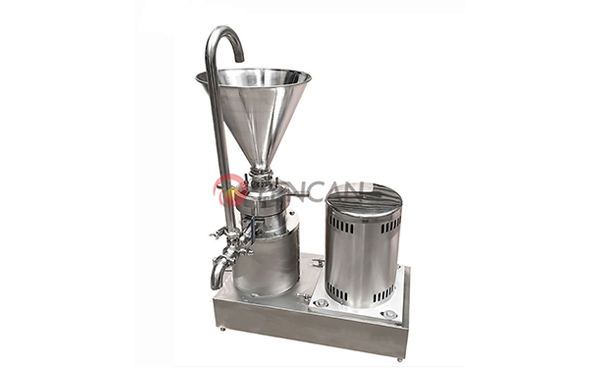
1. Only switching valves, continuous operation of pumps and mills, truly achieving uninterrupted production.
2. It can be processed and customized according to user needs, and all models are reserved with external interfaces, which can expand their functions and production capacity. It can be either fixed factory production or mobile on-site production.
3. There are two control modes: manual/automatic integration and manual.
4. It can produce ultra-high content modified emulsified asphalt (SBS content ≥ 4%, asphalt content ≥ 65%).
5. Can produce ultra-high content modified asphalt (SBS content ≥ 12%).
6. On site guidance for installation and operation, providing optimized and state-of-the-art production processes and formulas.
Colloidal mills are mainly used for the fine grinding of wet materials in food, pharmaceutical, chemical, and other industries. They can perform the grinding, emulsification, homogenization, and mixing of various semi wet and emulsion substances. Colloid mills are divided into vertical colloid mills, split type colloid mills, horizontal colloid mills, laboratory colloid mills, etc. Divided into integral stainless steel colloid mill and main stainless steel colloid mill: mainly used for mixing and emulsification of wet materials.
Application Industries and Scopes:
1)Food and beverage industry: jam, fruit juice, protein milk. Various dairy products, ice cream, beverages, health products, food additives, and various seasonings.
2) Pharmaceutical industry: nutrient solution, traditional Chinese patent medicines and simple preparations, antibiotics, serous preparation, emulsion pharmaceutical.
3) Chemical industry: pigments, coatings, lubricants, disinfectants, emulsions, thickeners, liquid chemicals.
4) Daily chemical industry: cosmetics, shampoo, detergent, skin lotion, perfume.
